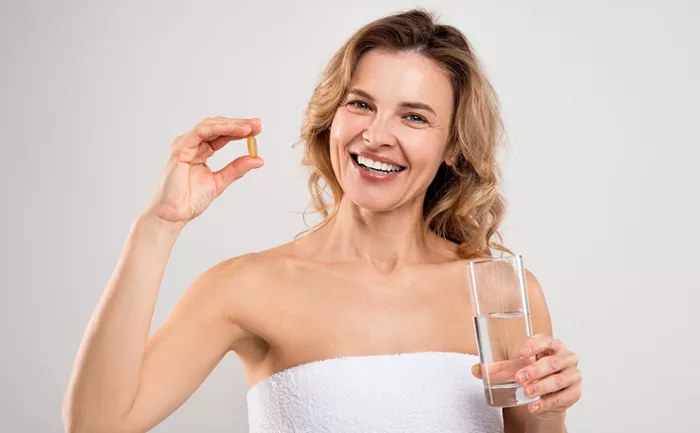As women, we often lead busy lives and can feel drained of energy. While a balanced diet and regular exercise are important for maintaining energy levels, certain vitamins can also help boost energy and combat fatigue. In this article, we will discuss the top ten energy vitamins for women, including their benefits and food sources.
What are the energy vitamins for women
Vitamin B12 is essential for energy production and can help combat fatigue. It also plays a role in the production of red blood cells, which carry oxygen to the body’s tissues. Good food sources of vitamin B12 include meat, fish, eggs, and dairy products.
Vitamin B6 is important for the metabolism of carbohydrates, which are the body’s main source of energy. It also plays a role in the production of neurotransmitters, which are essential for brain function. Good food sources of vitamin B6 include poultry, fish, bananas, and potatoes.
Vitamin D is important for bone health and immune function, but it can also help boost energy levels. It plays a role in the absorption of calcium, which is important for muscle function. Good food sources of vitamin D include fatty fish, egg yolks, and fortified foods such as milk and cereal.
Iron is essential for the production of red blood cells, which carry oxygen to the body’s tissues. Iron deficiency can lead to fatigue and decreased energy levels. Good food sources of iron include red meat, poultry, fish, beans, and leafy green vegetables.
Magnesium plays a role in energy production and can help combat fatigue. It is also important for muscle and nerve function. Good food sources of magnesium include nuts, seeds, whole grains, and leafy green vegetables.
Vitamin C is important for immune function and can also help boost energy levels. It plays a role in the production of collagen, which is important for skin and joint health. Good food sources of vitamin C include citrus fruits, berries, kiwi, and peppers.
Thiamine, also known as vitamin B1, is important for energy production and can help combat fatigue. It also plays a role in nerve function and carbohydrate metabolism. Good food sources of thiamine include whole grains, pork, and beans.
Riboflavin, also known as vitamin B2, is important for energy production and can help combat fatigue. It also plays a role in the metabolism of fats and carbohydrates. Good food sources of riboflavin include dairy products, eggs, and leafy green vegetables.
Niacin, also known as vitamin B3, is important for energy production and can help combat fatigue. It also plays a role in the metabolism of fats and carbohydrates. Good food sources of niacin include meat, fish, and whole grains.
Folate, also known as vitamin B9, is important for energy production and can help combat fatigue. It also plays a role in the production of red blood cells and DNA. Good food sources of folate include leafy green vegetables, beans, and fortified foods such as cereal and bread.
What benefits can female energy vitamins bring
Improved Energy Levels
One of the primary benefits of female energy vitamins is improved energy levels. Certain vitamins, such as B vitamins and vitamin C, play important roles in energy production and can help combat fatigue. By incorporating these vitamins into a balanced diet, women can improve their energy levels and feel more alert and focused throughout the day.
Better Mood
In addition to improving energy levels, female energy vitamins can also help improve mood. Vitamin D, for example, has been shown to help improve mood and reduce symptoms of depression. Other vitamins, such as B vitamins and magnesium, can also help improve mood by reducing stress and anxiety.
Improved Cognitive Function
Female energy vitamins can also help improve cognitive function. B vitamins, for example, play a key role in brain function and can help improve memory and concentration. Vitamin D has also been shown to play a role in cognitive function, with some studies suggesting that it may help improve cognitive performance in older adults.
Improved Immune Function
Certain female energy vitamins, such as vitamin C and vitamin D, are important for immune function. Vitamin C, in particular, has been shown to help boost immune function and reduce the duration and severity of colds and other respiratory infections. By incorporating these vitamins into a balanced diet, women can help support their immune system and protect themselves against illness and disease.
Improved Bone Health
Female energy vitamins can also help improve bone health. Vitamin D, for example, is important for the absorption of calcium and can help improve bone density and reduce the risk of osteoporosis. Other vitamins, such as vitamin K and magnesium, also play important roles in bone health and can help reduce the risk of fractures and other bone-related injuries.
Improved Heart Health
Finally, female energy vitamins can also help improve heart health. B vitamins, for example, can help reduce levels of homocysteine, an amino acid that has been linked to an increased risk of heart disease. Other vitamins, such as vitamin E and vitamin C, can help reduce inflammation and improve blood flow, which can help reduce the risk of heart disease and other cardiovascular problems.
Conclusion
Certain vitamins can help boost energy levels and combat fatigue in women. Vitamin B12, vitamin B6, vitamin D, iron, magnesium, vitamin C, thiamine, riboflavin, niacin, and folate are all important for energy production and overall health. Incorporating these vitamins into a balanced diet can help women maintain energy levels and feel their best. Good food sources of these vitamins include a variety of meats, fish, dairy products, whole grains, leafy green vegetables, and fortified foods.
Related topics


